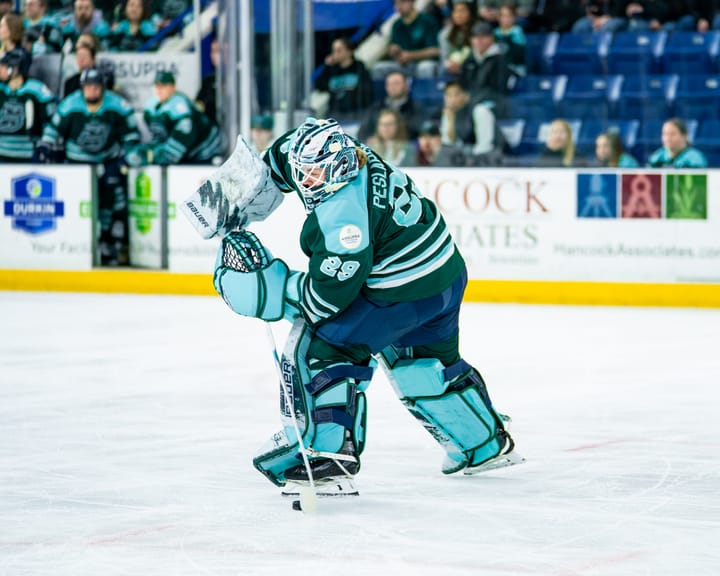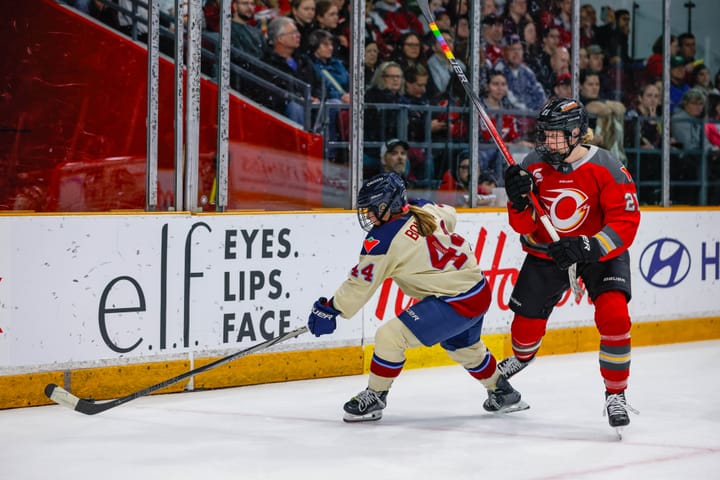Harrison Browne’s relationship with hockey is far from over
Browne spoke on Tuesday to students and faculty at American University about his experiences and future plans
More than half a year after his second Isobel Cup championship — and his (second) retirement — Harrison Browne is still making strides in advocating for inclusion in the hockey community. He spoke to a group of students at American University in Washington, D.C., on Tuesday about his experiences as well as his future career plans.
While Browne’s already faced challenges in becoming the first publicly transgender athlete in a professional sports league in North America, retirement has presented a whole new set of obstacles.
“At first it was a little tough to have so much free time and not really know what my passion was,” Browne said. “My whole schedule has been laid out for me since I was 9 years old, so it was interesting to not have a schedule at first.”
He certainly has filled up that time by telling his story to different audiences. In the months since his retirement, Browne has continued to run a Youtube channel where he discusses his experiences as a trans man, and he has made many speaking appearances at venues like American University.
Speaking at @AmericanU tonight! There’s nothing I would rather be doing than sharing my story as an out and proud transman... in Washington. ✊🏻#WeWontBeErased pic.twitter.com/nYtkYuMAVA
— Harrison Browne (@Hbrowne24) November 27, 2018
Additionally, he’s kept busy with a variety of hockey-related gigs.
“Right now I have a role with You Can Play, where I’m the liaison for their Scotiabank partnership,” Browne said. He’s working on training teams of players ages 13–17 in the Greater Toronto Area about inclusion in the locker room and on the ice.
He’s also continued his role as the inclusion leader for the NWHL board, but hasn’t had much formal involvement with the league other than that. However, even though he’s left the locker rooms of the NWHL, he’s still keeping up with the Riveters, the last team he played on before retiring.
“It’s tough when you come off a championship and have those high expectations and you lose your coach. There’s a large turnover on the team,” Browne said. “They’re in a rebuilding stage, but they had a really great win last game, and now that players are healthier they can have a great season.”
Beyond his current involvement in those inclusion positions, he’s still looking into front office careers in the sporting world.
“I’ve toyed with the idea of working in the corporate side of sports,” Browne said. “I think [my dream job would be] marketing, community relations, and trying to tie hockey into a greater meaning because of what I’ve gone through in the past two seasons.”
Part of Browne’s influence is something less formal than an official title, though — there’s something to be said for him just existing publicly. When he won the Isobel Cup for the first time with the Buffalo Beauts in 2017, his first thought was that his chosen name would be etched onto the trophy.
“Winning for me meant that ‘Harrison’ was going to live on in sports forever,” Browne said. “Not just the individual Harrison being me, but everything that I stood for as a transgender athlete.”
While Browne had positive experiences in the locker room, it was what happened once he stepped outside the rink that motivated him to finally retire and begin his physical transition.
“After having a taste of what it was like to be gendered properly at the rink and on the Internet, I became addicted to the feeling of finally being seen as who I was,” he said.
Browne counts himself lucky to have had such positive reactions from fans, teammates, and the league. This isn’t to say his experience has been perfect, though. He had issues with some family members at first, and he’s gotten his fair share of criticism on the Internet. But he also emphasizes that this hasn’t brought him down.
“For every negative comment I had or every negative tweet directed at me, I had 50 positive ones,” he said.
That being said, he’s certainly aware of the current attitudes toward transgender individuals in the American government, since his tweet (above) mentions the #WeWillNotBeErased hashtag, which is a response to a memo released in October that suggests that transgender individuals may essentially be defined as nonexistent in American law.
But things in Washington aren’t all doom and gloom. Browne also commented on the hockey culture in Washington. Although he’s primarily a Toronto Maple Leafs fan, he also keeps up with Washington hockey.
“I used to be a Washington fan, actually. I really loved Ovechkin growing up,” Browne said. “I definitely tried to emulate some of my play based on him.”
He also believes that Washington could be a possible NWHL city in the future.
“Seeing the success that the Capitals have had; people like the hockey here. I definitely do see Washington having a good market for it,” he said.
After his speech, Browne took questions from students seeking his tips for young people hoping to come out, took photos with students, and also reiterated the importance of making as many public appearances as possible.
“Transgender individuals are being targeted left and right,” Browne said. “If just one person sees my story, sees my face, and doesn’t feel so uncertain about transgender people, then I’m doing my job.”





Comments ()